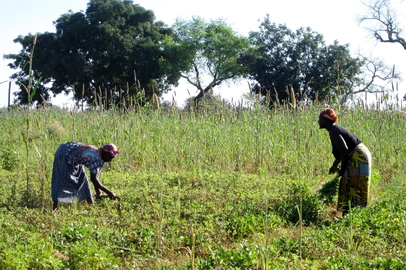Gender differences in land use planning decisions - case study Indonesia
April 24, 2014.
Gender equality is central to sustainability and is therefore among the high-priority goals addressed in the post-2015 development agenda. Though a lot of studies link gender with agriculture, health and food security, few show how gender-specific roles influence multifunctional landscapes, which in turn also affect ecological sustainability.
Gender’s role in land use decisions
The capacity of land to provide different goods and ecosystem services may be affected by the connection between gender and land use decisions (i.e., preferences for new land use options). This includes gender-specific dissimilarities in lifestyles and consumption patterns affecting the condition of the environment. We assume that stereotypes between men and women exist. For example, women are supposed to live more sustainably than men and leave smaller ecological footprints such as CO2 emissions. This is based, among others, on the assumption that women travel less than men. Moreover, there is a contrast between how females and men choose and select land management practices.
Research approach
A comparative study is currently being conducted at ZEF in collaboration with the World Agroforestry Centre and students from the WASCAL graduate program. The study verifies the hypothesis that the appreciation of tree cover and its associated ecosystem services varies according to gender and ecological knowledge. A multi-method approach is being implemented using a variety of tools such as land use intensity analysis, role-playing games and agent-based modeling (Fig. 1). The approach was first implemented in the province Jambi on Sumatra, Indonesia. Here, we explored the role of gender as a factor in decision-making about alternative land use options and in response to new investment opportunities. Currently, the approach is being replicated in Vietnam, the Philippines, and Northern Ghana.
Preliminary findings
The first implementation of the approach in Indonesia showed that women approached proposals by external investors on logging or oil palm conversion very positively. Consequently, the resulting land use change was more dynamic and extensive than in the equivalent men-only groups. Contrary to expectations and gender stereotypes, it is expected that more involvement of women in landscape- level decision making will increase emissions from deforestation and forest degradation in the area. This poses further challenges to efforts to reduce such emissions.
Gender differences may matter
While some push gender equality as a pre-condition to sustainable development, it may be worthwhile recognizing the different roles of gender types. These include dissimilarities in physical strength, age, culture and wealth. This global comparative research hopes to bring new insights to the discussions on the post-2015 sustainable development goals.
Author: <link mail window for sending>Grace Villamor
You can also read the article ZEF news no. 29 <link fileadmin webfiles downloads news zef_news_29_2014 zef_news_29_englisch_villamor.pdf download file>here.



